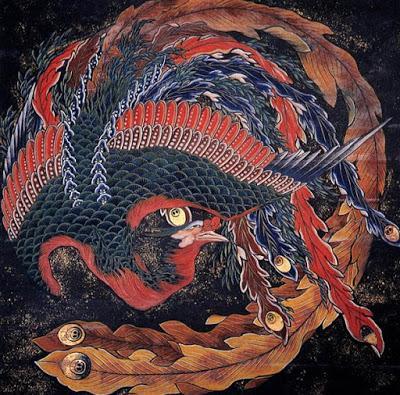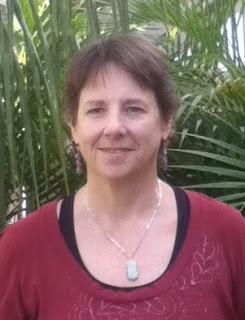
Phoenix by Hokusai
I originally found my way to a health club yoga class to find relief from stress and pain and I found the relief that I was seeking, but for the most part I was only showing up physically and temporarily releasing muscular tension. I did become a yoga teacher after that to help others find the stress relief that I was experiencing, but it took a lot of time before I figured out how to work with emotions on the mat.In 2008, after about eight years of teaching yoga, I entered a Masters in Clinical Mental Health program, where I was encouraged to look at my emotional baggage as part of the program. About a year in, my body started talking loudly to me again in the form of pain. In my search for relief, I found Phoenix Rising (PR) Yoga Therapy. At that time, I considered Phoenix Rising to be a self-care break as I proceeded with my degree. I now know it to be a way of living fully.
Phoenix Rising combines traditional yogic philosophy with modern self-help psychology. Self-awareness is the focus. A truly embodied mindfulness meditation in action is facilitated through the use of asana and dialogue, encouraging participants to be present to their inner landscapes and emotional lives in the best way they can in each moment. It encourages us to take an aware, embodied approach to making empowered life choices.
During the three years in which I trained in Phoenix Rising as a yoga teacher and then a yoga therapy practitioner, I looked deeply into myself in both my graduate program and my yoga training. At the same time my husband battled cancer and won and two dear yoga teachers also faced health battles, one of whom did not win. I myself recovered memories of physical assault, worked on the emotions surrounding my own chronic health issues, and worked deeply on the emotional baggage of being raised by an abusive narcissist. In other words, I worked with grief, anger, and shame.
One of the ways that Phoenix Rising supported me in this and taught me to support others is through holding space. Holding space is the challenging process of being fully present to another without judgment, trying to fix, or having any expectations of outcomes. Many people have never had this experience. It can be moving and transformative. It helps us to begin to see that we have value in our own right, that we are worthy of love and acceptance and that we can choose to be with ourselves in a way that is likely different than anything we have previously experienced. It helps us to begin to understand that our self is not our Self and that we are more than what we have been taught we are, that we are more than our thoughts and emotions, that we are Divine beings just as we are. The yogic concept of “born Divine” is alien to most westerners. I was so steeped in the idea that we have to earn love that I consider it a deep samskara, a mental rut into which I still fall.
Through the course of a Phoenix Rising class or therapy series we learn how to wait for the mud of experience and reaction to settle so that we can see more clearly and look deeper at our inner experience. In my case, I held anger toward my mother for not being what I would have wanted her to be and for not giving me the emotional tools needed to navigate a healthy life. As I looked deeper I saw under that anger was a profound grief, a grief for the idealized mother I never had, grief for the child that suffered, and eventually grief for the emotionally damaged person that was my mother. As I looked deeper still I saw shame: shame at having these “negative” emotions, shame at not being able to better handle or hide them because no one wants to be around negativity, and shame at not being good enough, not being lovable, being to emotional…. I also felt shame and responsibility for being victimized.
But the process of Phoenix Rising helped me—and I now offer this same help to others—to be embodied in a mindful way not just in a special posture or series designed for this, but in also learning I already have the tools and knowledge to figure things out for myself. It taught me how to look and listen within, and how to hold space for what I found. It taught me to listen to what my body, mind, and emotions might need in yoga practice and in life. And it taught me through experience that nothing is permanent; not my thoughts, emotions, life circumstances, or beliefs.
As I let go of believing that I was a victim, I became empowered to determine what I wanted and make decisions for myself based on what was best for me. This enabled me to cut ties with my mother, and to withstand the judgment of others about that choice. That was when the healing began for me.
Like me, most of the people I have talked to about this topic feel that the emotions of grief, anger, and shame do not occur alone. As we grieve, we can find feelings of anger about the loss and shame for being angry. This is reflected in the Kubler-Ross model of grief, which lists anger as the second stage of grief. Also, when anger is the primary emotion, we are likely to find grief as we look deeper. Shame is harder still to acknowledge and express.
I am also struck by the—sometimes invisible—cultural attitudes toward these emotions. In Western culture, difficult emotions tend to be avoided. We deny, we self-medicate, we blame shift—we do many things to not feel. It is also interesting that, when asked about grief, people almost always speak of the loss of a loved one. This is certainly one of the most painful losses we can experience, but let’s not ignore the multitude of other losses that can be a part of the fabric of our lives. Do you experience grief over a lost job, a financial setback, lost health, the betrayal of a friend or lover, or an unfulfilled dream? People often avoid discussing their anger, choosing instead to focus on grief. Yoga in general and Phoenix Rising in particular provides us with the space and context to feel and process all of our emotions.
In yogic philosophy, we are taught that one of the ways to move beyond is to move through, to remain open and allow. In this context, I suggest that “moving beyond” is not forgetting, being all better, or giving up. What I refer to is the ability to move beyond the constant reaction of the small “s” self into the ability to live an increasingly full human life while holding space for what you have lost, to find meaning in a life after the loss. This is a process. At first it might seem frightening. I often hear people say that they shut these emotions down because they are afraid that if they open to them they will never stop crying. But we do. And each time we allow ourselves to feel them they are a little easier to hold. With time they pass through us more smoothly, can even become friends—or at least familiar and less overwhelming visitors. In the words of a mentor, we can “learn to put them in the back seat instead of letting them drive the car.”
Western culture talks of negative emotions, but yoga teaches us that emotions are just emotions. They arise and fall, like the breath, like thoughts. It is possible to hold space for them, to recognize them, to care for ourselves even as we allow them to pass through us. This, too, is part of being human, embodied. It is a part of the richness of this life, what we are here to experience. It is when we get caught up in the stories of the small “s” self that we move into reaction and become overwhelmed.
The only person who can fully understand your experience of grief, anger, and shame is you. I offer you this story and the accompanying thoughts in the hopes that you might be able to draw some helpful information or a sense that you are not alone in this process of navigating a human existence and all of the myriad challenges it offers.

Subscribe to Yoga for Healthy Aging by Email ° Follow Yoga for Healthy Aging on Facebook ° Join this site with Google Friend Connect

